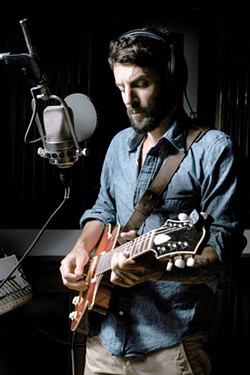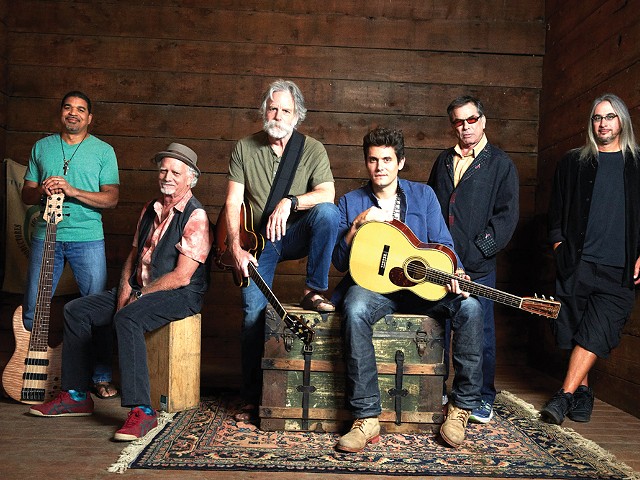The narrative arc of Ray LaMontagne’s career is an interesting one, though he’s not entirely interested in looking back and discussing earlier points from which he’s traveled. He’s here right now, and, to be honest, this is about as fine a point along that arc to join our cosmic hero as any. Let’s tune in.
Ouroboros, LaMontagne’s latest, is a sprawling album, one that demands a concerted and supine break from reality. It’s a Floydian departure from the 2016 “indie rock” scene, comparable probably only to Jim James’ most recent solo stuff. And wouldn’t you know it? LaMontagne brought James into the studio to produce this one, and the rest of the guys in My Morning Jacket are now touring with him. It’s all of a piece.
The album’s first side begins with a pastoral chord progression laced across tinkling keys and LaMontagne’s breathy encouragement (mirroring the beginning of the second side, by the way). “Sunset through the trees, I can’t remember the faces I’ve seen, low and mean,” he sings. It’s cinematic.
It’s also a giant leap from his previous stuff, five other albums spanning his 12-year career. Still, LaMontagne, speaking to us from the road, says he entered the studio the same way he always has: cool and collected, greeting the muse with open eyes. Most of the album was cut in 10 days.“I didn’t have any goals — anything different than any other record, really — except just to make a good record,” LaMontagne says. “You know, just bring the material in and just make it as beautiful as we could.”
They seemed to accomplish that mission. As in previous trips into the studio, LaMontagne let something higher than himself guide the process. Both he and James have a knack for feel over technical trickery.
“It’s really intuitive — you just go in there and play it. I’m not really the kind of guy who likes to build stuff and stack things up, one instrument at a time. I like to sit down with the musicians in the same room and just play it and see what they bring to it. It’s always surprising that way. They can learn the charts and they can learn the songs, but they always bring their own soul into it. It blooms into something else.
“Working with Jim was really great. It was just great,” LaMontagne says. “We’ve been wanting to do it for a while. I’m just really thankful, and I think he is too, that it didn’t work before, because this material was really perfect for this project, this collaboration. It really spoke to Jim, and felt really strongly about it and had really strong opinions about how I wanted it to go down.”
“Anything you want your life to mean, it can mean,” he sings on “Hey, No Pressure.” It’s a fairly heavy song, despite the airy chimes drifting in and out of the chorus and the galaxy-wide fermatas that dot the verses like a warm and soothing pox.
And that’s the thing: LaMontagne demonstrates a real sense of growth in how he’s approaching dynamics as a songwriter. This is certainly a statement album, and he knows it. We spoke a bit about his earlier works — albums like Trouble and Till the Sun Turns Black, which are so often held in high regard to this day by music fans in general — and it was clear that LaMontagne is putting some distance between the writer he was then and the writer he’s become.
“I hear myself singing too much and pushing too hard and over-shaping the songs [on those earlier albums],” he says. “Not everything — there are little moments where I think — there are some gems, I guess, in there. But so much of it to me is me wrestling with my own critical voice and trying to learn how to write a song.”I don’t write hit songs. I’ve never written a hit song, so why would I start now — 12 years into a career — start caring about singles.
tweet this
So far, so good, inasmuch as this album portends. LaMontagne has been playing Ouroboros in its entirety to open his shows on this tour, and he says that it’s been received very well from his vantage point. It’s meant to be experienced as immersively as possible.
The album is divided quite literally into to halves, which can be taken as two individual trips or as one whole odyssey across LaMontagne’s latest vision. Take heed: This is a cosmic record, one that pulls no punches in the brain-infiltration department. LaMontagne’s knack for song structure will worm its way into your head by the time you’re midway through the second track.
There’s no turning back at that point.
“Well, the record presented itself to me in this way,” LaMontagne says. “So, you know, there’s probably a side of your brain that could go in there and, with some of these melodies, manhandle them and chop them and force them into some kind of shape that would be acceptable to radio. But why would I do that? I don’t write hit songs. I’ve never written a hit song, so why would I start now — 12 years into a career — start caring about singles. I appreciate singles. I love to hear a pop song, two-and-a-half minutes long, that just kicks ass. I love it. But I don’t write that way.”
Detroit will get a taste of this latest bend in LaMontagne’s journey, and if previous shows on this tour are any indication, the evening should be quite enlightening. One can almost picture the musician backstage, waiting for the pulse of the planet to nudge him toward the next step in his own evolution. With Ouroboros now marinating in his catalog, the omens ahead seem positive. LaMontagne certainly thinks so.
“I just thought it was beautiful and patient, and I felt lucky that it was coming to me,” he says.
Ray LaMontagne performs at 7 p.m. on Tuesday, July 26 at Meadow Brook Amphitheatre, 3554 Walton Blvd. in Rochester Hills. Tickets $29.50-$69.50.
This article is reprinted from Metro Times’ sister paper, Cleveland Scene.






